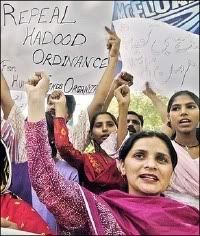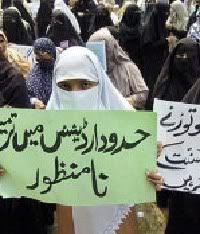 The women’s protection bill of Pakistan — which will dramatically alter the rape laws of Pakistan — has a chance of being passed this coming Monday. The bill is an attempt to reform the draconian rape laws of Pakistan from 1979, passed by then dictator Zia ul Haq under the auspices of the religious establishment (part of the hudood ordinance).
The women’s protection bill of Pakistan — which will dramatically alter the rape laws of Pakistan — has a chance of being passed this coming Monday. The bill is an attempt to reform the draconian rape laws of Pakistan from 1979, passed by then dictator Zia ul Haq under the auspices of the religious establishment (part of the hudood ordinance).


This has been a contentious issue in Pakistan (see my commentary on it here). I have been in correspondence with individuals who are involved in the Women’s Protection Bill. While on one hand they have had to contend with the religious establishment, they have also ran into opposition by some liberal groups, and international NGO’s like Human Rights Watch, who find the proposed amendments inadequate.
What the reformists are trying to explain, however, is that while total repeal of the bill would be wonderful, politics is a process, and that means taking whatever progress that can be gotten right now. While concerns about the fact that the bill is being pushed through by a dictator (Musharraf) are valid, they are unfair in light of the tremendous abuses that will be alleviated if this bill is passed. In the short term, the reformists — and those backing the bill — need our support. Later, more progress can be made.
In an op-ed that appeared in The Daily Times today (10 September, 2006) Feisal Naqvi points out:
…the response from women’s groups to the proposed Women’s Protection Act has either been hostile or at best, tepid. Instead of supporting the bill, women’s groups have only reiterated their demand for the complete repeal of the Hudood Ordinance. What these groups forget is that politics is the art of ‘the possible’. The Women’s Protection Act may not be perfect but it will certainly bring relief to millions of oppressed women. In any event, the fight for repeal can always be carried on later.
The reformists need to be recognized for the good they have achieved despite the enormous difficulties, and not to be criticized for what they have failed to achieve. The full article by Feisal Naqvi in The Daily Times is worth a read because it clearly explains what the issues are and how they are being dealt with in the new law. It concludes:
If all goes according to the government’s plan, much of what is undesirable in the Offence of Zina (Enforcement of Hudood) Ordinance, 1979 (to give the law its full name) will be quietly gutted through the proposed Protection of Women’s Act… The proposed law marks the absolute limit of what is possible in terms of today’s political climate. More importantly, the Protection of Women’s Act is not a whitewash job: instead, it addresses and fixes the major sources of women’s oppression under the Hudood Ordinance.
The best thing to do right now is to support the efforts of the reformists and later carry their torch further. It would be a terrible tragedy if after decades of efforts the amendments were tabled due to inadequate support by progressives. Well intentioned people around the world need to express their support. (For more see: ‘The Right To Own Women’ and Women’s Protection Bill Cheat Sheet). [Also see earlier ATP Poll on related issue].
Ali Eteraz describes himself as “a continental philosopher, essayist, novelist, student of Islamic arts, philosophy, jurisprudence and a practitioner of global nomadism” and blogs under this pseudonym at Eteraz, where you will find much on this and related subjects.




















































Mr. Samdani, your comments forced me to go into further research. Though by Googling I could not come up with statistics except for vehement arguments for and against the ordinance.
I could only get hold of following information from Charles Kennedy: Status of Women in Pakistan. According to him from 1980 to 1984 145 men and 114 women were convicted by lower courts. However, after the conviction reached the federal shariat court, only convictions of 71 men and 30 women were retained. The rest were set free.
Moreover, I have read the Hudood Ordinance and it states that women can’t be punished for failing to prove the claim of rape. However, if it is proved that the accusation was brought in with malafide intention and was false, then and only then can she be punished. Seems sensible but then I am not a lawyer.
PatExpat, you ask some good questions. But do you mean that if ANY women at all support it then there must be something wrong. So, if any women at all (10, 100, 1000, 10000) support it then it should stay? If the same number oppose it, then what?
But the real question you ask is about how many men have been convicted under this provision. Till at least last year when I read the number, the total number was 0 (ZERO) men cconvicted under the rape provision. That is exactly the problem. A woman needs 4 witnesses under this law to prove it is rape. If she does not have 4 eye-witnesses, the it is presumed that she was committing adultery and its HER fault! So, she first gets raped, then gets socially excluded, and then sent to jail…
Dear All,
ANAA, Asian American Network against abuse of Human Rights, is holding a rally to “repeal Hudood Ordinance” in NY City on 18th September, 2006 – 5-7PM.
Please read our criticism on Musharraf’s government playing with Hudood Ordinance. We stand for Hudood’s Repeal.
Please visit here to know more about our Rally and our article by our Publication Director, Rafia Zakaria.
http://4anaa.org/NY-rally/nyRally.htm
regards-Zafar
I am amazed to see that we are having a debate about something that should be a no brainer in this day and age. The Hudood Laws must be ablished, period, end of sentence.
This change could bring some relief to the Women in Pakistan who are largely oppressed. I am sure a large percentage of them are clinically depressed as well. Go deep down to a micro level of a life of a girl in sindh or frontier or Balochistan or Punjab and find out what goes on. They are almost like commodities. Following lines from Faiz are perhaps about those nameless, perpetually persecuted humans. (This poem is most appropriate for this post; it will be great if someone could post it here in entirety)
meri zaat zurra’ae benishaa’n
mera dard naghma’ae besada
meri zaat kaa jo nishaa’n milay
mujhe raaz razme-e-jahan milay
Talking about opening new horizons for the participants on this terrific blog any thoughts about the blasphemy laws? Did Bishop John Joseph’s life go in waste? What are the hopes for getting back to what were supposed to be Pakistan’s roots? Could anyone tell us what religion has become in Pakistan?
No Adnan, I am not going to read those links. Since you seem to know so much about it, why don’t YOU explain it to me in layman’s terms as to what is wrong with the bill?
Of course, I won’t be able to understand it sitting in my air-conditioned room and liberal mindset, now would I be? Why don’t YOU explain it to me?